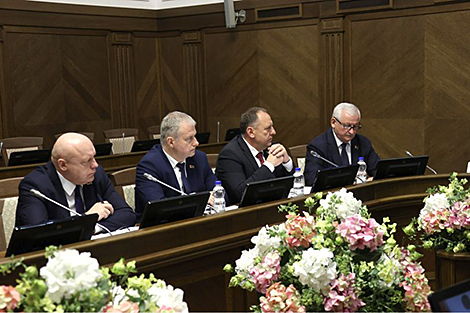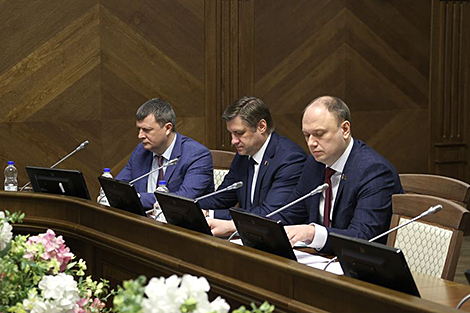Business news
Belarus’ PM outlines priority talks for agricultural sector

MINSK, 17 April (BelTA) – There is a number of tasks that should be given special attention in the country’s agricultural sector, Belarusian Prime Minister Roman Golovchenko said at a meeting to discuss certain problems in the country’s agricultural industry in Minsk on 17 April, BelTA has learned.
According to Roman Golovchenko, a large-scale meeting on agricultural development and efficiency of the agricultural industry was chaired by the head of state the day before. “Today we should first talk about the tasks that have been set not only for the agricultural industry, but also for the whole vertical of power. Let me remind you that the main task is the full mobilization of all resources to increase the agricultural output by 6-7% and secure export revenues to the tune of at least $9 billion,” he said.
“We cannot say that these tasks are brand new. They have been voiced in different forms before. Some of them were repeatedly mentioned during the president's visits to various agricultural enterprises and various meetings. Therefore, there is nothing fundamentally new here. The only question is how we approach their solution. I am systematizing the instructions that the president gave yesterday so that we can once again engage in this work. Today is the time to sort out and decide on the priority actions to implement these instructions,” the prime minister stressed.
According to Roman Golovchenko, the first one is to secure a solid fodder base and adequate feeding, including the development of a program to provide livestock breeding with concentrated fodder.
The second one is to change approaches to pig breeding, increase the efficiency of pig breeding complexes with a full and economically feasible provision of processing enterprises with domestic pork.
The third one is to reformat crop production to work in any atmospheric conditions. “Constant references to the weather have become tiresome. Heat waves, cold spells, rain, snow. The climatic situation is unstable across the globe. We do not have some extreme weather conditions here,” the prime minister said.



The fourth one is to ensure careful use of machinery and its timely restoration and repair, exclusion of unjustified purchases of imported analogues.
The fifth one is to secure iron technological discipline at all stages of production.
The sixth one is to increase the pace of construction and modernization of livestock facilities to transfer livestock to modern technologies and maintenance, clear plans and requirements, cost-effective project, return on investment.
The seventh one is to improve the safety of livestock through increasing requirements at every workplace - from cattle breeder to head of the farm - and rectification of the situation with unjustified livestock deaths. “Such facts should be considered at the regional level as an emergency with the need for appropriate response measures,” the head of government said. 100% processing of domestic raw materials with the production of products with high added value and digitization of tasks for processors.
The eighth one is to address the issue of staff shortage in certain rural areas through the development of proper living and working conditions there. “These are the main tasks that were set yesterday,” the prime minister said.







 print version
print version make home page
make home page add to bookmarks
add to bookmarks

